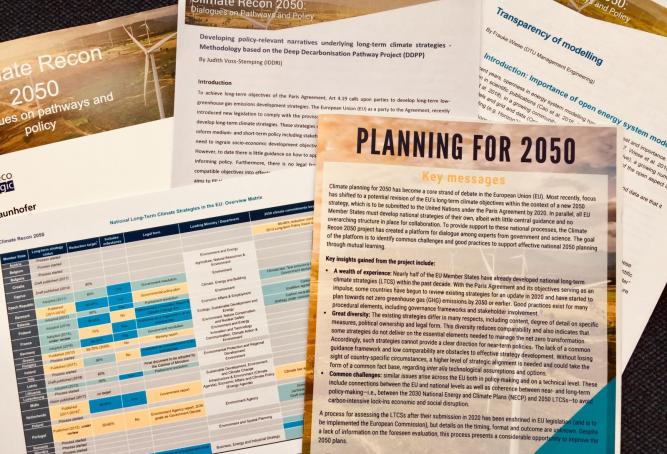Outputs
Below, you will be able to find all the outputs, including publications, summary notes and webinar recordings, produced throughout the lifetime of the Climate Recon 2050 project.
Before the first outputs of the project are made available, we invite you to explore our collection of Partner Publications: a selection of papers and other documents on the topic of climate strategies, decarbonisation scenarios and long-term climate governance, produced by the project’s partners.
Climate Recon 2050 platform ends, but work on pathways to climate neutrality continues
The Climate Recon 2050 platform was in operation for almost 5 years, from early 2018 to the end of 2022.
Date of Publication:
2022
A list of all documents published in the project since 2020
This page compiles all public outputs of the 2020-2022 period of the project, which focused on analysing submitted national long-term climate strategies (LTS).
Date of Publication:
2022
The insights generated during the project’s workshop and dialogue events, as well as the research conducted to inform the discussions are captured in the multiple publications produced within the framework of the project. Written by experts from leading organisations in the field, this collection constitutes a rich resource on different aspects of long-term climate modelling and planning.
Date of Publication:
2018-2019
This report presents the assessment and comparative analysis of long-term climate strategies of Poland, Czechia, Hungary and Slovakia. It identifies best practices and weaknesses of these strategies. Based on the findings, the analysis provides the guidelines ahead of the upcoming update in line with the Governance Regulation.
Date of Publication:
2022
This Briefing Note presents insights from the third Policymaker Platform of Climate Recon 2050. It explains the role dedicated institutions can play within a comprehensive governance framework to co-ordinate climate policy within the government.
Date of Publication:
2019
This note explores the way the concept of energy sufficiency can contribute to building compliance with the Paris Agreement. After clarifying the concept and its link to social, economical and ethical concerns, it discusses the reasons why sufficiency should be considered as an important mitigation option, and how to introduce it in modelling work to fully reflect its potential role.
Date of Publication:
2019
This Briefing Note focuses on the interaction between planning instruments at the EU-level with different time horizons and their implications for the Member States. Moreover it explores the topics of stakeholder consultation and developing a compelling narrative for long-term climate transformation - building upon case studies and examples of developments from around the EU.
Date of Publication:
2019
The successful implementation of efforts to accelerate greenhouse gas emissions reduction requires social acceptance, which, in turn, is dependent on distributional impacts that climate action may have on different types of economic actors, sectors and geographies. This note presents the drivers of the transition costs as well as available analytical tools that enable the quantification of the distributional effects of the long-term climate policies.
Date of Publication:
2019
Climate planning for 2050 has become a core strand of debate in the European Union. Focus has shifted to a potential revision of the EU’s long-term climate objectives within the context of a new 2050 strategy, which is to be submitted to the United Nations under the Paris Agreement by 2020.
Date of Publication:
2019
In the last years the aim of "reaching net zero emissions" gained political momentum. Building compliance with the Paris Agreement will require developing policies and measures aiming for this "net zero" goal. In this note we discuss the definition and implication of net zero emissions and conduct comparative analysis of three case studies from Germany, France and Scandinavia.
Date of Publication:
2019





